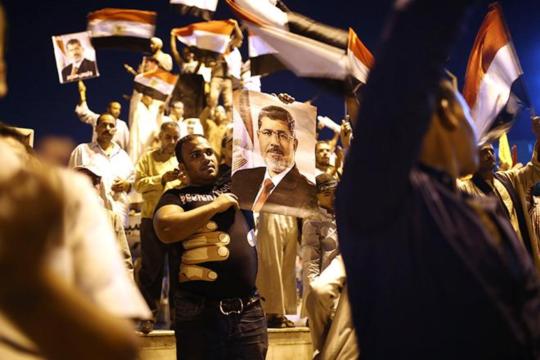
 |
|
Supporters of ousted president Mohamed Morsi demonstrate in the street [Getty Image News] |
The definition, legal and political implications of the seizure of state power in Egypt
With the current political and legal debacle in Egypt, the disagreements about the definition, legal and political implications of designating the seizure of state power as a “coup d’état” have once again re-emerged. This report argues that the removal of President Mohamed Morsi is not a revolution and is rather a coup. While both the anti-Morsi and pro-Morsi camps have broad-based support, nonetheless, without the active involvement and grand design of the coup by the armed forces, President Morsi would have remained in power. In other words, the protests by the opposition camp would not have created political pressure sufficient enough to bring about the resignation or removal of the President. Hence, the overthrow of president Morsi does not fulfil the basic elements of a revolution. Instead, it reflects the imposition of the will of the military with the support of the opposition over those who won a democratic election a year ago. When a military establishment that has ruled a country for five decades effectively removes an elected president, such an action constitutes a classic example of a coup.
Furthermore, given that the same person, General Sissi, currently holds the ministries of defense and deputy premiership, it is clear that the leaders of the armed forces are in control of the transitional process. Thus, whether it is well prepared or not, the army now is in a no-win situation. On the one hand, reinstating Morsi to power risks a total loss of public faith in the military that had previously enjoyed a special place in the history of Egypt. On the other hand, the military would find it very difficult to maintain its course as stipulated in the roadmap without using force against the disenfranchised and extremist elements of the Muslim Brotherhood. The use of violence would draw the military into direct conflict with a large section of the population and inject it into the centre of the Egyptian political crisis. The pro-Morsi protest may metamorphosis into an underground resistance unless its main grievances are addressed. Their violent methods may not be limited to the military, but to all political forces that are seen to cooperate with the military. A situation that it abhors most, a direct conflict with large segments of the population, would negatively affect the stature and legitimacy of the military in the public eye.
Neither the military nor an interim civilian government could maintain power in Egypt by manipulation or intimidation. More importantly, the current crisis and the increasing violence reveals more than anything else that governance by sheer force, and through the exclusion of the Muslim Brotherhood, is going to be a very risky undertaking for the stability of Egypt and the region at large.
The African Union on the Egyptian Crisis
In 2011, the North African uprisings forced many people, particularly officials of the African Union and leaders of African states, to pause and debate the normative, legal and institutional aspects distinguishing revolutions from other unconstitutional changes of government as well as those instruments governing unconstitutional changes of government(1). Of all the global governance institutions, only the AU has unequivocally categorized the ouster of President Morsi as an unconstitutional change of government. Consequently it has suspended Egypt from participation in all AU activities including the Peace and Security Council until constitutional order is restored. The United States of America (USA) and the European Union (EU) have also expressed their grave concerns on the involvement of the army, but stopped short of calling it a coup or an unconstitutional change of government. Significantly, the USA has decided to review its aid to the Egyptian military establishment.
The decision of the AU states “that the overthrow of the democratically elected President does not conform to the relevant provisions of the Egyptian Constitution and, therefore, falls under the definition of an unconstitutional change of Government, and [a]ccordingly, and as mandated by the relevant AU instruments, the Council decides to suspend the participation of Egypt in the AU’s activities until the restoration of constitutional order”(2). This swift and unequivocal response to the crisis in Egypt emanates from the AU’s normative framework developed in response to specific historical circumstances and the nature of African states and political parties. Historically Africa has experienced more than 100 coups d’état(3). For this reason, the AU was and is better disposed to, and prepared for, responding to unconstitutional changes of governments than to revolutions. The AU has four main instruments, of which two are directly applicable to the crisis in Egypt, namely (i) the African Charter on Democracy, Elections, and Governance (the Addis Charter);(4) and (ii) the Lomé Declaration of July 2000 on the Framework for an OAU Response to Unconstitutional Changes of Government (the Lomé Declaration)(5). As argued elsewhere(6) in this brief article, it is contended that no tension exists between revolutions and the AU’s normative frameworks. Revolutions should be viewed as extra-constitutional and therefore different from unconstitutional events. Both the letter and the spirit of the AU laws support public demands to ensure the general will of the people. Taking the principle of interpretation based on the object and purpose of law, the AU normative frameworks aim at entrenching constitutionalism and establishing constitutional regimes in Africa. Moreover, the legislative intentions of the Lomé Declaration and the Addis Charter do not ban revolutions necessitated by prevailing unconstitutional governance in a country. Indeed, as stated in many legal and philosophical texts, the AU has supported popular demands for changes of illegitimate government. It is considered that people have the right to change their government when all other amicable and constitutional means of replacing that government do not exist. The Right to Revolution as stated by John Locke is not only an entitlement of the people but also an obligation when a government breaches the trust it enjoyed from the people(7). Since revolution is carried out outside the normal procedures of a constitution, it becomes extra-constitutional. The legal and philosophical perspective of the right to revolution rests on its extra-constitutional nature. Revolution expresses the general will and capacity of the people to change governments that refuse to reform meaningfully to meet the demands of the people. From this perspective, revolution is an extra-constitutional legitimate means of replacing a government when the desired change of government is not available through constitutional means.
The two AU instruments categorise the following five situations as unconstitutional changes of government: 1) military coups d'etat against a democratically elected Government; 2) intervention by mercenaries to replace a democratically elected Government; 3) replacement of democratically elected Governments by armed dissident groups and rebel movements; 4) the refusal by an incumbent government to relinquish power to the winning party after free, fair and regular elections(8). Article 23 (5) of the Addis Charter added a fifth situation that amounts to an unconstitutional change of government and refers to “… any amendment or revision of [a national] constitution or legal instrument which is an infringement of the principle of democratic change of government”. This would amount to an unconstitutional change of government. The main test should rely on a substantive assessment of the circumstances within which the change of government takes place. More importantly, it stipulates that amendments to constitutions are to be carried out only when a national consensus is achieved. A cumulative reading of Article 5 and Article 10 of the Addis Charter stipulates that amendments to constitutions should take place when possible by consensus or through a referendum when necessary. This was not the route followed in the recent ouster of the Morsi government.
Based on this definition, unconstitutional changes of government could take the form of an illegal replacement of a democratic government as provided for in situations 1, 2, and 3, or emplacement of some body or group in power in situations specified under 4. Many current governments, which have been in power for more than 15 years, came to power in the 1990s through the situations specified under situation 3. While replacements of government as provided for under 1 and 4 have shown marked increases in frequency in recent years, the situations specified under 2 and 3 are nowadays quite rare. The unconstitutional seizure of power by the Egyptian army adds to the all-familiar problems Africa is currently facing in Mali, and Madagascar.
Coups d'état undertaken by the elite segment of a population constitute the more typical unconstitutional changes of government in Africa. The causes of coups d'état are dissatisfaction of elite military or civilian groups with the incumbent government. Even if many of the African governments who adopted the Lomé Declaration were governments that came to power through unconstitutional means, mainly by military or military-supported coups d'état, few of those deposed leaders were considered democratically elected even though their countries were also under constitutional rule.
In specific reference to coups, the Lomé Declaration refers to a “military coup d’état against a democratically elected Government” which could be construed as indicating that a coup d’état against any undemocratic government is acceptable. This would in effect encourage coups d'etat against governments perceived as undemocratic, thus becoming a licence for dissatisfied military groups such as the current coup in Egypt. Accordingly, there is no good coup and bad coup as argued by some writers(9). In Africa, up until now, all coups have been bad. Legally and politically, the Egyptian case is not substantively different from what happened in Madagascar or Mali, where in both cases the army toppled democratically elected governments that performed badly, with popular support from the opposition.
The Credibility Test: the markers of distinctions between a Revolution and a Coup
Based on the existing AU normative framework, the elements marking the distinction between a coup and a revolution could revolve on what I call ‘the credibility test’(10). The credibility test also offers three conditions that justify a removal of a government as a consequence of revolution when and where these three conditions are met. These are:
1. Violations of substantive rights: Systemic violations of constitutional values including human rights;
2. Violation of trust of the people: Government has a fiduciary duty to the governed, when the government deliberately and systemically violates the declaration of trust; and
3. Absence of constitutional mechanisms for redress: the lack of, or systemic manipulation of, constitutional mechanisms for solving or redressing wrongs.
Changes of government based on popular protests need to be credible both in and outside the country. Substantively, it is important to show that the incumbent has violated the rights of the majority to rule and the rights of the minority to be respected. The violations have to be widespread grave, gross and systemic violations of human rights. Nevertheless, not all kinds of violations of human rights constitute causes for revolution. So far as the public is concerned, president Morsi’s government was not particularly implicated in systemic massive violations of human rights and anti-constitutionalism. Opposition parties were not prohibited from protesting and contesting the government’s views, the press was not stifled, and institutions such as the judiciary, the military, and prosecuting authorities were not abolished.
Indeed President Morsi’s attempt to monopolize some judicial and other powers through a presidential declaration could be cited as a deliberate violation of the declaration of people’s trust. Nonetheless, this was immediately corrected when the opposition raised concerns and protested, an indication of the President’s amenability to undertaking corrections. But more importantly, one year was too short a time for a president of a country to prove his leadership towards democratic and constitutional governance. It would be very difficult to convince the Egyptians and non-Egyptians alike that the only remaining option was the removal of the president in order to eliminate the causes of the grievances suffered by the anti-Morsi camp(11). Therefore, Egypt’s current change of government does not fulfil the three conditions justifying revolution in a country.
For the AU, restoration of constitutional order may either be: 1) the reinstatement of Mr Morsi to the Presidency, which is highly unlikely given the polarized stance of both the Army and the opposition parties on the one side and the Muslim Brotherhood and its supporters on the other; or 2) conducting a democratic election that enjoys the credibility of both internal and international parties. The most feasible route out of this crisis is to seek an inclusive civilian-controlled and run transitional arrangement with a cabinet composed of all political actors.
The AU has already announced the appointment of three former heads of state and government and including Prof. Alpha Konare, former President of Mali and Chairperson of the AU Commission to spearhead an international effort to the current crisis. This is a step in the right direction. Nevertheless, the team does not include Northern African personalities who could bring not only legitimacy based on a regional representation but also the required understanding of the Egyptian political drivers and security landscape and more importantly the necessary diplomatic connections and leverage within the region. This is a source of serious concern not only on the selection criteria but also on the effectiveness of the team.
__________________________________
* Mehari Taddele Maru is an international consultant on African affairs based in Addis Ababa. He was the Programme Head for African Conflict Prevention Programme. A former fellow of very prestigious programmes at Harvard University, he holds Doctorate of Legal Sciences (DSL) from JL Giessen University, MPA from Harvard University and MSc from the University of Oxford and LLB from Addis Ababa University. Prior to joining to ISS, he was Programme Coordinator for Migration at African Union Commission. Dr Mehari served as a Legal Expert at the African Union Commission and as the Director of the Addis Ababa University Office for University Reform.
References
(1) This is a brief summary of a presentation to the 284th to AU Peace and Security Council and the Permanent Representatives Committee joint plenary session on the strengthening of the African Peace and Security Architecture (APSA) of the African Union to improve prevention, management and resolution of the crises emanating from popular uprisings in Africa.
(2) Communiqué of the Peace and Security Council of the African Union (AU), at its 384th meeting on the situation in the Arab Republic of Egypt, 5 July 2013.
(3) See Anyangwe, Carlson (2011) ‘Understanding the Phenomena of Unconstitutional Changes of Government in Africa’, Pp. 26-48 in Gutto, Shadrack (ed) Shared Values, Constitutionalism and Democracy in Africa, Fortune-Africa Publishing.
(4) African Charter on Democracy, Elections, and Governance, Assembly/ AU / Dec.147(VIII). The Addis Charter has already entered into force in January 2012 with 15 ratifications from Member States of the AU. Many of the principles of the Addis Charter are drawn from existing African and UN conventions and practices, thus enjoy universal acceptance from states.
(5) OAU Assembly of Heads of State and Government, Lomé Declaration of July 2000 on the framework for an OAU response to unconstitutional changes of government (AHG/Decl.5 (XXXVI).
(6) Mehari Taddele Maru, Rethinking the North African Uprisings, The African Union Herald, Volume 2, October, 2011, www.au.int; The African Union Normative Framework and the North African Revolutions, presentation to the Joint Plenary Session of the Peace and Security Council and Permanent Representatives Committee of the African Union, Addis Ababa, Ethiopia, September 2011; Mehari Taddele Maru, On Unconstitutional Changes of Government: The Case of Libya; Institute for Security Studies, ISS Today, http://www.iss.co.za/iss_today.php?ID=1358 (accessed 17 January 2012); Mehari Taddele Maru, How the AU Should Have Recognized the Libyan NTC; Institute for Security Studies, ISS Today, http://www.iss.co.za/iss_today.php?ID=1348 (accessed 28 November 2011).
(7) John Locke, Two Treatises of Government in Thomas Hollis (ed) (1764), the Online Library on Liberty.
(8) OAU, Lomé Declaration of July 2000 on the framework for an OAU response to unconstitutional changes of government (AHG/Decl.5 (XXXVI), Lomé, Togo.
(9) For detailed analysis see an insightful article by Francis Ikome (2007) Good Coups and Bad Coups, the limitations of the African Union Injunctions on unconstitutional changes of power in Africa, Occasional Paper No 55.
(10) For detail see my article listed under note 7 above.
(11) Despite its success to change the imperial government of Tsar Nicholas, the October Bolshevik insurrection fails short of a revolution as it has taken power from a coalition of liberal government led by Kerensky. The seizure of power by the Military Revolutionary Committee that stormed the Winter Palace and toppled a provisional government would have constituted a coup d’état as per the Lomé Declaration if hypothetically we assume this happened now in Africa. Montefiore Simon (2003) Stalin, The Court of the Red Tsar, Orion Publishing Group, London UK; Montefiore Simon (2006) The Young Stalin, Orion Publishing Group, London UK.
